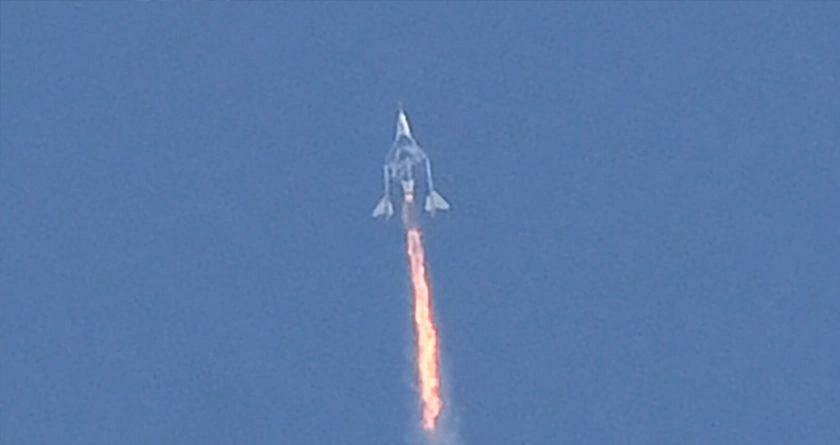
With the rise of space tourism, environmental problems are exacerbated
How space tourism will raise environmental issues? Know more…
Monday, 19th July 2021
After years of waiting, Richard Branson’s space journey on the Virgin Galactic spacecraft this month should have been a triumphant return. On the contrary, this excursion caused major criticism of its carbon footprint.
As Jeff Bezos will launch on the Blue Origin rocket on July 20, and Elon Musk’s SpaceX plans to conduct a fully civilian orbital flight in September, emerging The space tourism industry is facing severe problems affecting its environment.
At present, the frequency of the entire rocket launch is not high enough to cause serious pollution.
"Compared with other human activities and even commercial aviation, carbon dioxide emissions are completely negligible," Gavin Schmidt, NASA's chief climate adviser, told AFP.
But some scientists worry that the industry may suffer more long-term damage, as the industry is preparing for significant growth, especially the impact on the as yet unknown ozone layer in the upper atmosphere.
Virgin Galactic publicly criticized its billionaire founder on CNN, Forbes, and social media for taking a fossil-fuel-consuming spacecraft into space for a few minutes. The company said its carbon emissions are roughly equivalent. Air tickets to business class. From London to New York.
The company “has taken measures to offset the carbon emissions of its test flights, and is studying opportunities to offset future customer flights carbon emissions and reduce the carbon footprint of our supply chain,” it said in a notice to AFP.
However, according to an analysis published on The Conversation by French astrophysicist Roland Lehoucq and his colleagues, although transatlantic flights carry hundreds of people, Virgin Atlantic’s emissions per passenger on six-passenger flights are approximately 4.5 tons.
This is roughly equivalent to driving a typical car around the earth and is more than twice the personal annual carbon budget recommended for reaching the Paris climate agreement goals.
"The problem here is indeed one of the disproportionate effects," Darin Tuhi, an atmospheric scientist at the University of Colorado Boulder, told AFP.
"I actually grew up in the space program, which led me to science... But if someone gives me a ride, I will be nervous because I know my own footprint is better than it should. It's much bigger," he said.
Also Read: Delhi Paints Dire Picture With Worrying Spike in Levels of NO2 in Air.
Cleaner fuels possible
Virgin Galactic's SpaceShipTwo uses a synthetic rubber as fuel and burns it into nitrous oxide, a powerful greenhouse gas.
Fuel pumps black carbon into the upper stratosphere, 3,050 kilometers (18 to 30 miles).
Once there, these particles have a variety of effects, from reflecting sunlight and causing nuclear winter effects, to accelerating chemical reactions that deplete the ozone layer, which is essential to protect people from harmful radiation.
"We may be at a dangerous moment," Toohey said, and he hopes to conduct more scientific research on these effects before launches become more frequent.
Virgin has stated that it hopes to fly 400 times a year.
Compared to Virgin Galactic's SpaceShipTwo spacecraft, Blue Origins is cleaner. According to a recent article by aerospace scientist Martin Ross, Bezos' company contacted the article on Twitter.
That's because it burns liquid hydrogen and liquid oxygen, burning like water vapor.
Ross’s paper found that, based on rough estimates, the ozone loss and climate forcing caused by Blue Origin’s reusable vertical launch rocket are 100 times and 750 times less intense than Virgin.
But this does not mean that it is completely clean.
"You need electricity to produce liquid oxygen and liquid hydrogen," Ross told AFP.
"You can go back and calculate how much electricity is used to make propellant," he said. "It depends on how far back it is in the supply chain."
Space shaming?
Compared to the impact of rockets going into orbit, the impact of suborbital launches like Virgin and Blue Origin pales in comparison.
When SpaceX sends four ordinary citizens into space in September, it will use its Falcon 9 rocket. Calculations show that the rocket generates carbon emissions equivalent to 395 transatlantic flights.
"We live in an era of climate change and it is not a good time to start an activity that increases emissions as part of a tourism activity," Annette Toivonen, author of the book "Sustainable space tourism," told AFP.
Compared to when these companies were established in the early 2000s, global awareness of the climate crisis is now much higher, which may encourage companies to find ways to minimize pollution through cleaner technologies, thus solving problems before.
"If you can't tell others that you are a space tourist, who would want to be a space tourist?" According to Toivonen, he teaches at the Haaga-Helia University of Applied Sciences in Finland.
The News Talkie Bureau
Source:
Phys.org











